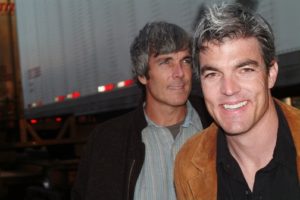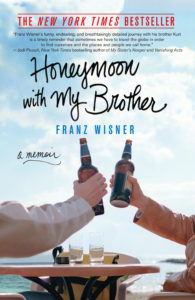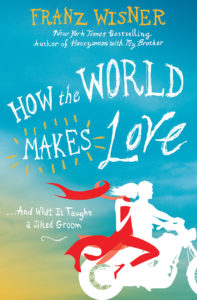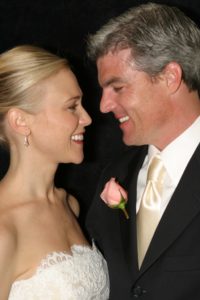
A Conversation with Franz Wisner
Lowestoft Chronicle interview by Nicholas Litchfield (June, 2012)

Jilted by his bride days before his wedding and demoted at work soon afterwards …these traumatic events turned out to be a blessing in disguise for Franz Wisner, whose decision to spend his two-week honeymoon in Costa Rica with his brother proved so fruitful and enriching that he extended it by two years, visiting fifty-three countries in Eastern Europe, Southeast Asia, South America and Africa in the process. His subsequent memoir, Honeymoon with My Brother, hit number 18 on The New York Times bestseller list and landed him guest spots on “Oprah” and “The Today Show.” In addition, Sony Pictures purchased the movie rights. Put simply, Franz Wisner has achieved the improbable—the perfect breakup.
This month Lowestoft Chronicle caught up with Franz Wisner to discuss his books and life after the honeymoon.

Lowestoft Chronicle (LC): I’m a big admirer of Honeymoon with My Brother. I think it’s an incredibly entertaining, eye-opening and inspiring book. It landed you on the NYT bestseller list, a guest spot on “Oprah,” and you sold the movie rights to Sony Pictures …were you surprised at all by its success? And what is the status on the movie version?
Franz Wisner (FW): Thanks, Nicholas. Always thought you had great literary tastes!
The short answer is, yes, I was surprised the book took off. I imagined a travelogue that would be buried in the travel sections and passed between a couple backpackers. But as I started to write, several universal themes began to emerge, including a yearning for stronger family relationships and the importance of taking lemons and making, well, margaritas! These themes took over and broadened the book’s appeal. Books tend to take on a life of their own if you let them. And you should always let them.
My honeymooning brother and I received some nice press coverage. But the book clubs are what really made Honeymoon soar. They embraced it early on. They had a lot of fun with it — serving wedding cake and champagne, donning veils or bridesmaid dresses, dishing up foods and wines from around the planet. Love, love, love the book clubs. To this day, we’ll call or visit any that invite us to their gatherings.
Funny you should ask about the movie. We’re in negotiations with a couple production companies and producers right now. Stay tuned.
LC: Would those be the same producers who pitched your book as a cross between Jerry Maguire and Planes, Trains and Automobiles?
FW: No, the people bidding on the movie are no longer the ones who pitched it as Jerry Maguire meets Planes, Trains and Automobiles. That group split into two camps — a dramatic comedy Maguire group and a broad comedy Planes faction. The writer ended up splitting the difference and pleasing neither side. So Kurt and I got the rights back and are in the process of lining up a new team. Very excited about the people out there who want to get involved. Nothing to announce as of yet.
LC: You’ve said it took a year to write once St. Martin’s Press bought the pitch. Did you find writing the book an easy process? It was your first book, after all.
FW: To me, writing a book is like working out at the gym. Some sessions feel great, some are a slog, others make you want to wretch. But you’re always making progress, and hopefully by the end of the process you’re in decent shape. Memoirs can be especially tough. You have all the information inside you, yet sometimes that’s the hardest information to access.
LC: There are some memorable episodes and characters in Honeymoon with My Brother, like Douglas of Trinidad (“the world’s worst cab driver”), Chad and “the Packers”, the Turkish soldier driving away in the rented Saab, and the George W. Bush photograph in your wallet that got you over the border into Syria. You got a lot of mileage out of that photo. Do you still carry it in your wallet?
FW: Um, no. I’m done with politics. I need to get some different photos. Ones of people like Bono or Bill Gates. Or Oprah! Hey, you’ve given me a grand idea. I have a couple good shots of us on Oprah. I’m going to laminate those and put them in my wallet. Brilliant. Thanks.
LC: Your nightmare bus ride in Malawi, where a guinea fowl crashes through the window, is one of my favorite scenes. Would you say that journey was the toughest point in your trip, or were there worse moments?
FW: I’d say the Malawi bus trip was the toughest and also the most rewarding of the trip. You’ll notice there are several story arcs in the book. One story thread involves our mode of transportation. We start the honeymoon with a new car in Sweden and end on the buses of Africa. I learned a hell of a lot more on the buses than I did in a car.
LC: I think your interactions with your brother Kurt are what make Honeymoon with My Brother such a superb book (interactions like your analysis of discussions over the family dinner table). I read in an interview that you “didn’t take notes or keep records of conversations” during the writing of the book. Is this true?
FW: When traveling, my preference is to take just enough notes to remember the scenes later. Kurt and I also take a lot of photos to remember details. I cringe when I see writers on the road spending all their time on their computers. Experience first. Write later.

LC: There are some exceptionally funny moments in How the World Makes Love, like your interview with a Czech porn star (“What do you say to a man who’s had sex with a village?”) and your examination of the Karma Sutra (“There had to be a tip or two in there, something that could help me navigate those awkward moments”). But the one thing that stands out to me is that there aren’t many conversations between you and Kurt. There’s some funny dialogue early on (the first verbal exchange is in chapter 3), when you ask Kurt what’s the one thing everyone always asks about your travels. How come there isn’t more?
FW: Yes, Kurt gets pushed out of the honeymoon suites in favor of a woman. Non-related, nonetheless! She spoons a lot better than Kurt. I was going to write How the World Makes Love as a third-person look at love. Then I fell in love and had to chuck the idea. The book ended up being two love stories – the world’s and my own.
LC: In the words of your grandmother, LaRue: “You don’t regret the trips you take, only the ones you decline.” Are there any trips you regret taking or not taking?
FW: No regrets on places I’ve been. I’d like to return to most. Brazil or India, for example. Not itching to revisit others, places like Zimbabwe until they get rid of that thug Mugabe. The one big country still on my to-visit list is China. My great-grandfather founded a university in then-Canton at the turn of the century. I’d like to do a family roots trip.
LC: Readers have often invited you to stay with them when you’re in their neighborhood, and you’ve frequently taken them up on their offer when it fits into your schedule. However, your trip to Nicaragua is an odd deviation. The fan at the book signing in Rancho Cordova, California, suggested you go to Nicaragua instead of Panama. His arguments didn’t seem that compelling to me. What convinced you to change your schedule?
FW: His smile and his energy, more than anything. Alejandro Lacayo has this amazingly infectious personality. I got a warm, inviting vibe from him that night at the book signing. You’re right. The decision to scrap Panama and visit Nicaragua wasn’t based on facts. It was based on feel.
LC: After reading Kurt’s afterword to How the World Makes Love, I couldn’t help but wonder if he had considered a writing career of his own. Between your two books, you both embarked on a hefty schedule of literary events, book club appearances, and television interviews, traveling the breadth of America. He’s obviously an adept writer with a different perspective on your travels. Did you both ever discuss the idea of writing separately about your travels?
FW: I agree. Kurt’s a solid writer. He prefers to spend his time taking photos, though. We posted a bunch of them on the websites www.honeymoonwithmybrother.com and www.howtheworldmakeslove.com

LC: In How the World Makes Love you describe how you met your wife, Tracy, and we, the reader, follow the relationship as it ripens (from the inauspicious first date, to marriage and fatherhood). I feel like you didn’t hold anything back when you wrote about the relationship. What was Tracy’s initial impression of the book?
FW: I think memoirs are like skinny-dipping. They don’t work unless you peel off every bit of clothing and jump into the water. I don’t enjoy books where I feel the writer is holding back. I didn’t want to commit that sin in my books. Thankfully, Tracy is an artist who values the artistic process. If anything she pushed me to reveal more.
LC: The book ends at the altar, leaving the reader wondering if there was a honeymoon. Did you go on honeymoon with Tracy, and if so, where did you go?
FW: Ha! Great question. Kurt got a two-year, 53-country honeymoon. Tracy and I had a two-day honeymoon in San Francisco. She has reminded me of this imbalance on several occasions.
We couldn’t do a big honeymoon at the time for a number of reasons — one young kid (Calvin) and another on the way (Oscar), book tour, acting jobs. Anyhow, I’m trying to even the ledger by taking them all on trips these days. We’re in the Cayman Islands now. Heading to Brazil for the month of July. I owe, I owe!
LC: Cayman Brac, Brazil …I’m shaking my head with envy. I’m glad marriage and fatherhood hasn’t put an end to the travels.
FW: Yes, trying to make the boys travel junkies at an early age. A wonderful addiction.
About the Author
Franz Wisner has written numerous articles and opinion pieces for the San Francisco Chronicle, Los Angeles Times, Coast Magazine, and others. He lives in Los Angeles with his wife, actress Tracy Middendorf Wisner, and their children Calvin and Oscar.
About the Interviewer
Nicholas Litchfield is the founding editor of Lowestoft Chronicle. He can be found at nicholaslitchfield.com
